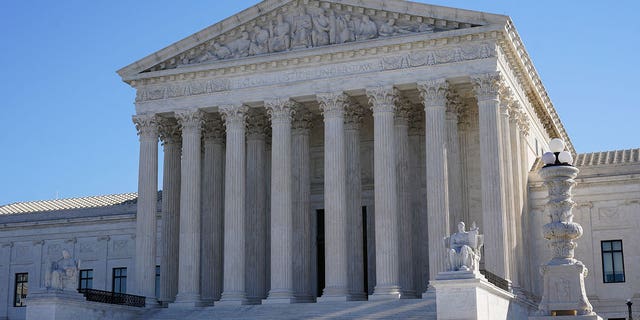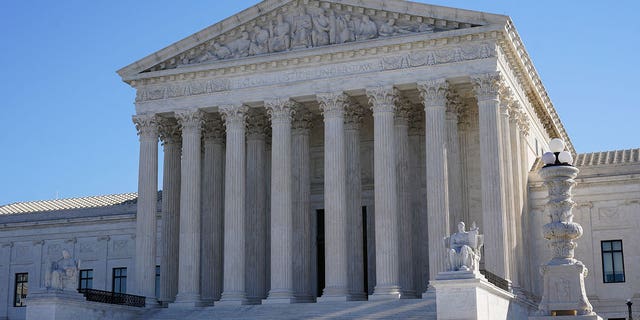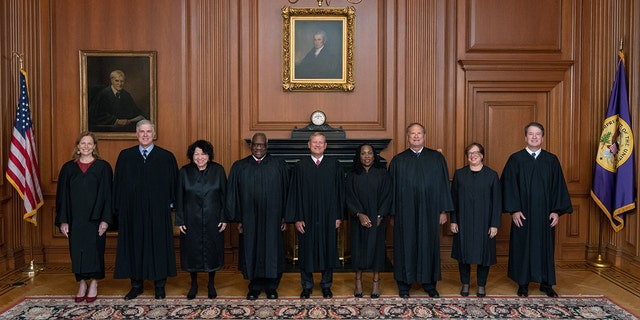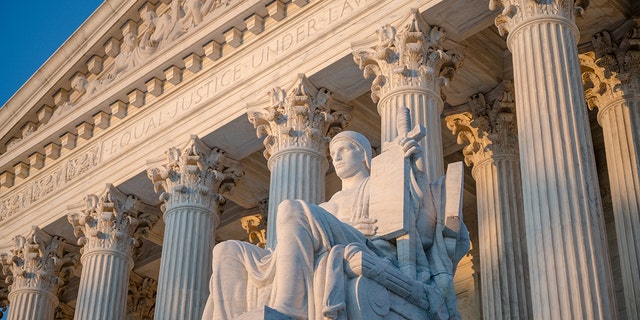
The Supreme Court on Tuesday will debate whether the state of Alabama’s congressional map illegally disadvantages Black voters.
Following the 2020 census, Alabama created a new redistricting map for its seven seats in the U.S. House of Representatives. A group of Alabama voters, NAACP and Greater Birmingham Ministries filed a lawsuit, claiming the new maps limited the influence of Black voters by placing people from “majority-Black counties … into majority-white Congressional districts in low enough numbers that Black voters have no electoral influence.”
They argue the map should be redrawn so that Alabama has two majority-Black districts instead of just one, Congressional District 7 (CD 7).
Alabama is set to argue that should the lawsuit prevail, the state will be forced into an unconstitutional practice of prioritizing race in creating election rules — which is what plaintiffs have accused the state of doing.

Supreme Court of the United States (AP Photo/Patrick Semansky)
FIVE MONTHS LATER, SUPREME COURT STILL INVESTIGATING WHO LEAKED THE ABORTION CASE
The state adds that Alabama’s redistricting plan followed existing districting lines and attempted to make “race-neutral adjustments for small shifts in population over the last decade but otherwise retain existing district lines.”
But plaintiffs say the demographics of the state mean Alabama needs to do more to give Black voters a chance to elect a Black representative.
“In the twentieth century, Black Alabamians have never elected a congressional representative in any district other than the packed majority-Black CD 7. And CD 7 has only been a majority-Black district since 1992,” plaintiffs argue. “As a result, Black Alabamians have the opportunity to elect a candidate of choice in only 14% of the congressional delegation…despite making up over 27% of Alabama’s voting age population.”
The issue before the court is whether Alabama violated Section 2 of the Voting Rights Act, which prohibits voting practices or procedures that discriminate on the basis of race. The decision could help bring long-awaited clarity to how the courts should interpret Section 2 in state redistricting cases.
The case was first decided by a three-judge panel in an Alabama district court in January 2022. The district court ruled, with two Trump-appointed judges, that Alabama’s map likely violated Section 2 and gave the state a two-week deadline to redraw a congressional map that includes two majority-black districts.

Justice Ketanji Brown Jackson was sworn in as the 104th associate justice of the Supreme Court of the United States on June 30, 2022. (Collection of the Supreme Court of the United States via Getty Images)
SUPREME COURT KICKS OFF NEW TERM WITH ORAL ARGUMENTS
Alabama filed an emergency appeal to Supreme Court Justice Clarence Thomas, asking the court to reverse the lower court’s decision. The Supreme Court granted the state’s request, temporarily allowing the current maps to remain in effect while both sides make their case to the Supreme Court, which they will do in oral arguments on Oct. 4.
Justice Thomas has previously written that Section 2 “involved the federal courts, and indeed the Nation, in the enterprise of systematically dividing the country into electoral districts along racial lines — an enterprise of segregating the races into political homelands that amounts, in truth, to nothing short of a system of political apartheid.”
America First Legal filed a friend-of-the-court brief on behalf of Alabama, arguing that, “This Court should do more than reverse. It should end our Nation’s decades-long unconstitutional experiment with court-mandated racial segregation in redistricting.”

Supreme Court of the United States
SUMMARIES OF HIGH-PROFILE SUPREME COURT CASES
But opponents of Alabama’s map say it’s all about diluting the Black vote.
“These new maps weaponize race to undermine the political power of communities of color in Alabama,” said Davin Rosborough, senior staff attorney for the ACLU and co-counsel on the case. “These maps violate the Constitution and run contrary to basic principles of fairness and representative democracy.”
CLICK HERE TO GET THE FOX NEWS APP
Adam White, senior fellow with the American Enterprise Institute, told Fox News Digital that a favorable ruling for Alabama would make it harder for people to challenge state maps.
“If the Supreme Court overturns the lower court’s decisions, that will reduce a lot of uncertainty around judicial review of districting because the people who want to challenge district lines will have to show much clearer evidence of discriminatory intent or effect,” he said. “So, judicial review will be much simpler.”








